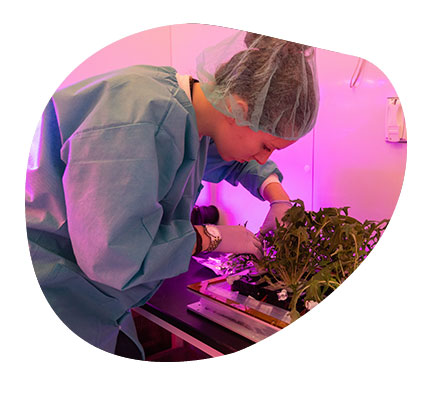
Our lives have been improved by space technology, and its breakthroughs are upending every aspect of human existence. The space-related research has enabled unparalleled innovation and technological advancement, leading to a broader range of applications and new use cases since the beginning of the space age in 1957. In order to further these developments and satisfy the demands of a sustainable future, it is vital to train the next generation of space researchers.
Research in Space Exploration (RiSE) is a SPROS programme developed for university students who are highly motivated to undertake space technology and engineering research or pursue a career in space-related fields but currently lack proficiency and essential aptitude in the discipline. The RiSE programme strives to upskill budding researchers by providing them with the opportunity to work on advanced space research projects under the direct guidance and mentorship of experienced researchers from academia and industry.
Students gain the opportunity to engage in interdisciplinary space-related research, learn scientific communication skills, acquire best research practices and sharpen their technical thinking abilities in the spectrum of domains through the SPROS RiSE Programme. Furthermore, selected candidates get the chance to attend webinars, guest lectures, and networking events that equip them with exposure to hone their ‘Space Professional’ skills. During the programme, we also introduce selected candidates to the active research teams who could support them in their research areas. Promoting gender parity and inclusion of students in research from the regions where the space industry is still in its nascent stages is one of the programme’s key objectives

Undergraduate and graduate students with backgrounds in space science, technology, engineering, and related fields are eligible to enrol in the RiSE programme. Undergraduate students selected for the programme join as RiSE Research Associates, whereas students pursuing post-graduate degrees can engage as RiSE Visiting Researchers. The Research Associates and Visiting Researchers work directly under the guidance of SPROS researchers and scientists on specific research topics. All of the program’s commitments and obligations are part-time and unpaid. The RiSE projects are offered in remote (online) mode, some of which may be upgraded to on-site activity after the successful completion of the online module by the students. The conversion of a project to an on-site type purely depends on the project requirements and availability of the applicant.


Rise as a researcher with the upcoming batch of SPROS RiSE Programme
Before the commencement of the application period for a specific batch, students are given a comprehensive list of research project topics. A student may submit applications for no more than two project topics.
Only those candidates whose applications meet the minimal eligibility requirements are evaluated. English is the language of communication for each project.
The application form will be available for a specified window of time. Beyond that, no applications will be considered. Online application form will be activated once the application window opens.
Some projects might require participants to have additional skills and commitments, the details of which will be informed by the SPROS researchers and scientists after the review of the application.



Yes, there will be an initial application fee and participation fee.
Application Fee – 13,000 INR or 190 USD. It will be paid by the teams after completing the registration form.
Participation Fee – 7,000 INR or 100 USD. It will be paid by the teams which qualify for the IRC Finals to be held during February 15-18, 2022 at VIT Chennai, India. Application fee is non-refundable. However, if the competition doesn’t take place in the on-site mode then Participation fee will be waived off.
No. There is no limit to the number of teams that can register for IRC 2022. But only top 25 ranked teams in System Design and Development Review (SDDR) will be invited to compete in the on-site event.
The maximum allowable length and width of the rover are 1.5m and 1.2m, respectively.
There is no vertical height limit for IRC 2022. If the rover is oversized during a mission, the
team will be charged a penalty of 20% of the points scored during that mission.
No.
Yes. Teams are allowed to take interventions during the missions but there will be a penalty for each interventions.
The teams shall make One Rover. The Rover however may have swappable modules for carrying out different tasks. The modules shall be swapped by astronauts at the base station.

If you have any queries related to volunteer and coordinator opportunities, please contact.
GET INVOLVED